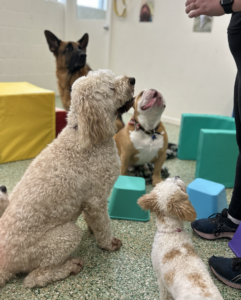The start of a new year presents an excellent opportunity to focus on fostering or enhancing good behaviour in our canine companions. More than just teaching commands, dog training is about nurturing a positive, mutually understanding relationship between you and your pet. Proper training can lead to a harmonious living environment and a content, well-adjusted dog. Discover the essentials of basic training techniques, understand the critical role of consistency, and learn how to tackle common behavioural challenges.
E
 mbracing Positive Reinforcement
mbracing Positive Reinforcement
At the heart of modern dog training lies positive reinforcement. This approach involves rewarding your dog for desirable behaviour, thereby encouraging them to repeat it. Rewards might include treats, praise, toys, or any other item your dog values. Key points to remember:
Immediate Rewards: Deliver rewards right after your dog exhibits the desired behaviour, ensuring they make the correct association.
Uniformity in Training: Consistency in rewarding behaviours and using commands is crucial, and this should be maintained across all family members.
Mastering Basic Commands
Start with fundamental commands like ‘sit’, ‘stay’, ‘come’, ‘down’, and ‘leave it’. These aren’t mere tricks; they’re essential for managing your dog’s behaviour and ensuring their safety in various scenarios.
Focus and Patience: Work on one command at a time until your dog reliably responds.
Engagement in Training: Keep sessions brief and engaging to hold your dog’s attention.
The Power of Consistency
Dogs excel with routine and predictability. Being consistent in your commands, rewards, and rules simplifies the learning process for your dog.

Adherence to Rules: If certain behaviours, like jumping on furniture, are off-limits, this rule should be enforced consistently.
Incorporate Training into Daily Life: Make training a regular, predictable part of your and your dog’s daily routine.
Dealing with Behavioural Challenges
Common issues such as excessive barking, chewing, or digging often signal underlying needs such as boredom, stress, or surplus energy.
Fulfill Their Needs: Ensure your dog gets ample physical exercise and mental stimulation each day.
Patience is Crucial: Understand that addressing behavioural issues takes time. Avoid punishment, which can lead to fear and aggression.
Seeking Professional Guidance
If you encounter persistent challenges in training your dog, don’t hesitate to seek expert assistance.
Consult Professional Trainers: A qualified dog trainer can offer tailored advice and solutions specific to your dog’s behaviour.
Consider Group Classes: These can provide excellent opportunities for socialization and learning in a structured setting.
While the new year is a perfect time to renew your commitment to dog training, remember that this is a continual, lifelong process. Celebrate each small success, stay patient during setbacks, and relish the bonding and learning journey with your dog.